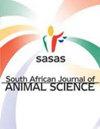Bone, microbiological and intestinal characteristics of piglets fed diets containing Lithothamnium calcareum
IF 0.6
4区 农林科学
Q3 AGRICULTURE, DAIRY & ANIMAL SCIENCE
引用次数: 0
Abstract
The aim of this study was to assess the effect of calcitic seaweed (CS), calcitic limestone (CL) and monodicalcium phosphate (DP) fed to piglets in various combinations on their gastrointestinal tract and bones. A total of 128 piglets (21 days old, 5.50 ± 0.49 kg bodyweight (BW) were assigned to treatments in a randomized complete block design and eight replications to one of four diets: D1: with CL + DP, D2: with CL, CS + DP, D3, similar to D2, but with 30% less calcium from CS and DP, and D4: with CS + DP. Treatments affected the metatarsal bones, mineral concentration in the heart and liver, and pH in the cecum and colon.Piglets fed D4 tended to have a greater Enterobacteriaceae count in the jejunum and ileum compared withD1 (4.82 vs 4.79 CFU/g). Piglets fed D1 and D3 had a greater Enterobacteriaceae count in their cecum than D4 (4.79 and 4.80 vs 4.76). The D2 and D1 treatments produced greater crypt depth (CD) in the duodenum and ileum compared with D3 and D4, respectively. Feeding D3 resulted in a greater villus height (VH) to CD ratio in the duodenum compared with D2 and showed a 24.5% increase in heart weight compared with fed D1. In conclusion, CS could be an alternative source of calcium source for piglets. The inconsistent findings of the present study suggest the need for further studies to better understand the interplay of effects of Ca2+ source and level on its metabolism.含钙石铁仔猪的骨骼、微生物学和肠道特性
本试验旨在探讨不同组合的钙质海藻(CS)、钙质石灰石(CL)和磷酸二钙(DP)对仔猪胃肠道和骨骼的影响。试验选用128头21日龄、5.50±0.49 kg体重(BW)的仔猪,采用随机完全区组设计,8个重复,分别饲喂4种饲粮:D1: CL + DP, D2: CL、CS + DP、D3,与D2相似,但CS和DP的钙含量减少30%,D4: CS + DP。治疗影响了跖骨、心脏和肝脏的矿物质浓度以及盲肠和结肠的pH值。与d1相比,饲喂D4的仔猪空肠和回肠中肠杆菌科细菌计数更高(4.82 CFU/g vs 4.79 CFU/g)。饲喂D1和D3的仔猪盲肠肠杆菌科数量高于饲喂D4的仔猪(4.79和4.80 vs 4.76)。D2和D1处理十二指肠和回肠隐窝深度(CD)分别高于D3和D4。饲粮D3使十二指肠绒毛高度(VH) / CD比高于饲粮D2,心脏重量较饲粮D1增加24.5%。综上所述,CS可作为仔猪钙源的替代来源。本研究结果的不一致表明需要进一步的研究来更好地了解Ca2+来源和水平对其代谢的相互作用。
本文章由计算机程序翻译,如有差异,请以英文原文为准。
求助全文
约1分钟内获得全文
求助全文
来源期刊

South African Journal of Animal Science
农林科学-奶制品与动物科学
CiteScore
1.50
自引率
0.00%
发文量
39
审稿时长
>36 weeks
期刊介绍:
The South African Journal of Animal Science is an open access, peer-reviewed journal for
publication of original scientific articles and reviews in the field of animal science. The journal
publishes reports of research dealing with production of farmed animal species (cattle, sheep,
goats, pigs, horses, poultry and ostriches), as well as pertinent aspects of research on aquatic
and wildlife species. Disciplines covered nutrition, genetics, physiology, and production
systems. Systematic research on animal products, behaviour, and welfare are also invited.
Rigorous testing of well-specified hypotheses is expected.
 求助内容:
求助内容: 应助结果提醒方式:
应助结果提醒方式:


